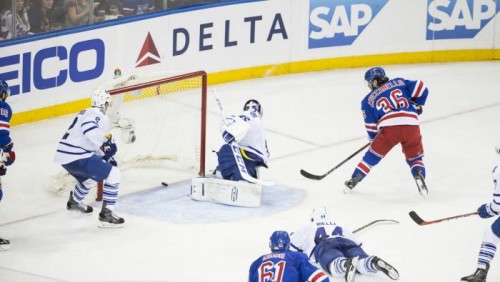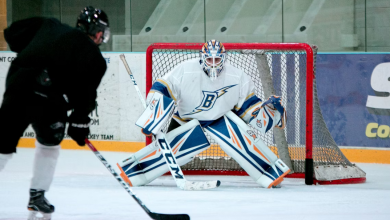Rangers Eye Down NHL’s Presidents’ Trophy, Again

The New York Rangers won the NHL’s Presidents’ Trophy last season for the first time since 1994 (Stanley Cup season), and it’s apparent the Blueshirts are eyeing down the Trophy again in 2016.
The Rangers are on a power-surge as of late…
New York is currently riding a nine-game winning-streak, which hasn’t happened since the 1972-1973 season. After Sunday night’s 4-3 win over a hot Toronto Maple Leafs group (yes believe it or not the Leafs were on a three-game winning- streak) the Rangers took sole-position of first place in the NHL’s league standings.
Why The Rangers Will Have Success In 3-on-3 Overtime
While the Rangers’ 14-2-2 record and 30 points has them sitting in first place for both the league and Eastern Conference standings, the Blueshirts have also distanced themselves from other top contenders in the Metropolitan Division. New York is currently seven points ahead of the second place Washington Capitals (11-4-1 — 23 points). Keep in mind, the Rangers have had Alex Ovechkin and company’s number the past few seasons, and the Rangers recently defeated the Caps by a score of 5-2 just two weeks ago.
The Rangers aren’t just living up to expectations this season, but are exceeding them. New York’s 57 Goals-For ranks third in the league for scoring, and the team’s offense has been one that can score at will; plus, chip in timely goals that has brought the Garden Faithful to their feet in exciting fashion.
Sunday night’s victory came within the final minute against the Maple Leafs — where forward Mats Zuccarello crashed the net hard, out hustled Toronto’s defense and put home a rebound goal for the game winner. “Zucc” leads the Rangers with 18 points (nine goals & nine assists), is a plus-nine and now has two game-winning goals. And, former Rangers’ player and the NHL Network’s Mike Rupp has even called the Norwegian player “A poor man’s Sidney Crosby,” interesting no?
VIDEO: Top 5 #NYR Plays of the Week; you think @zuccarello36 may show up once or twice? https://t.co/H9J55kLmmb pic.twitter.com/CPYicIhv7Y
— New York Rangers (@NYRangers) November 16, 2015
The Rangers offense has also been lead by Zuccarello’s center, Derick Brassard, whose 13 points are second on the team, and his plus-11 ranks him first on the Blueshirts. Oscar Lindberg has emerged as a key player for the Rangers, as the Swedish native has 12 points (seven goals & five assists) in 18 games played.
On the defensive side of the puck, the Rangers have allowed the fewest goals in the league to date (31). New York’s blue line has been lead by the play of team captain Ryan McDonagh and to a surprise, Kevin Klein. Offensive-defenseman Keith Yandle continues to be productive and help create scoring chances for the team’s forwards night-in-and-night-out — his ten points have him tied for fifth on the team with left winger Rick Nash.
Between the pipes Henrik Lundqvist and Antti Raanta have been near flawless. “The King’s” 10 wins lead the NHL (Tied with Minnesota Wild’s Devan Dubnyk), and Raanta has fit in nicely as the Rangers’ newest backup goaltender — 4-0 record ; 1.25 goals-against-average; and an impressive .955 save-percentage.
Another impressive aspect about New York – is how they continue to find ways to win games in different all sorts of fashion. Lundqvist and company are shutting out teams; they’re convincingly winning games 5-2′; and then the Rangers are winning the close one-goal games, whether it happens in overtime or in the shootout…the Broadway Blueshirts just don’t seem to give teams an inch this season.
The Rangers will gladly take another Presidents’ Trophy come April, but New York is eyeing down and surging towards their ultimate goal – of winning it all.
New York’s next game is against the Tampa Bay Lightning on Thursday November 19. The Rangers will look to win ten games in a row, which would tie a franchise-record dating back to the 1940 season.

